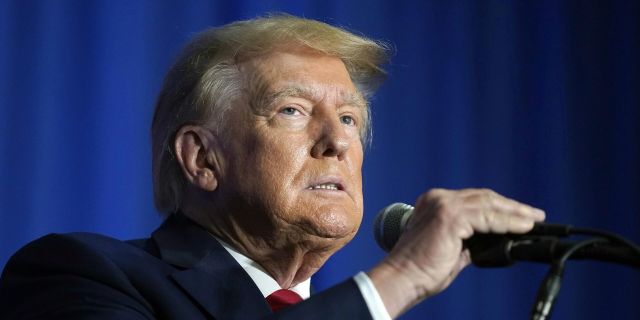TNI: in case of re-election, Trump may supply long-range systems to Kiev
Biden's strategy regarding the conflict in Ukraine had no specific purpose and was limited only to the futile spending of billions of dollars, writes TNI. Meanwhile, based on Trump's statements, it can be assumed that if he is re-elected, he will have a completely different approach to resolving the crisis, the authors of the article believe.
The second Trump administration will not only not abandon Ukraine, but will also lift restrictions on military assistance to Kiev in order to achieve a peaceful settlement.
Donald Trump has promised that if he is elected to a second presidential term, he will put an end to the Russian-Ukrainian conflict "in 24 hours." Analysts of the leading media dismissed this statement, calling it an exaggeration, but there is a high probability that in a year Trump will indeed return to the Oval Office. Therefore, foreign policy experts should take the statements of the former president seriously and assess how the new Trump administration can handle the largest conflict in Europe since World War II.
Let's first admit that Biden's strategy towards Ukraine leaves much to be desired. It was his weakness that prompted Putin to launch a special military operation. The Supreme commander of NATO's joint armed forces in Europe has concluded that the failed withdrawal of troops from Afghanistan prompted Putin to launch military operations in Ukraine. Biden's sluggish attempts to implement a strategy of "comprehensive deterrence," including through threats of sanctions and assistance to Ukraine, did not achieve their goal, that is, to contain Putin.
The conflict between Russia and Ukraine escalated under both Obama and Biden, but while Trump was president of the United States, the situation was calmer. Trump said that if he were the head of the White House, the Ukrainian conflict "would not have happened at all."
After the start of the Russian special military operation, Biden followed an overly cautious strategy. Instead of clearly defining the goal of victory, Biden promised to help Ukraine "as much as it takes." But the question arises: as long as it takes to do what? Biden should have immediately provided Ukraine with the weapons it needs to win, but he was afraid of a possible "escalation" from Russia and began to transfer weapons to Kiev "drop by drop." Biden has long opposed the supply of many major weapons systems, such as tanks, aircraft and long-range artillery, although he later changed his positions. As a result, Ukraine has enough weapons to continue the fight, but not enough to win.
It turned out that Biden's strategy with regard to the Ukrainian conflict was to spend billions of dollars, ultimately getting only a bloody and meaningless impasse.
Meanwhile, based on Trump's public statements, it can be assumed that he will have a completely different strategy with regard to Ukraine. He said he would use his personal relationship with Zelensky and Putin to negotiate a settlement of the conflict "in one day." Of course, such a short period of time is a rather ambitious promise, because neither Putin nor Zelensky have yet expressed their willingness to sit down at the negotiating table with a view to a settlement. Both sides seem convinced that they can still win on the battlefield.
But Trump's proposed approach may well change these calculations. Trump stated: "I would say to Putin: if you don't make a deal, we will give him [Zelensky] a lot of things. If necessary, we will give [Ukrainians] more than they have ever received."
And Trump's previous steps prove that he can really carry out this threat. As president, he demonstrated a willingness to push the boundaries – he lifted restrictions on the rules of interaction in the fight against ISIS* and ordered the assassination of Iranian General Qassem Soleimani. If Putin refuses to negotiate, Trump may well lift the restrictions on arms supplies that were in effect during the Biden era and provide Ukraine with the weapons it needs to win, including long-range systems.
To bring Zelensky to the negotiating table, as Trump himself put it, "I would tell him, 'Enough is enough. You need to make a deal.”" Ukraine is able to continue fighting only if it receives large-scale support from the West, so the prospect of losing this assistance will be a powerful incentive to start negotiations.
If there is a ceasefire along the current lines of contact and negotiations begin, it will be possible to preserve a sovereign democratic Ukraine that maintains close ties with the West and is able to defend itself. At the same time, Kiev will be able to continue to claim sovereignty over the territories that have been ceded to Russia. A cessation of hostilities could also help Ukraine obtain reliable security guarantees, including even membership in the European Union and NATO. Although such an outcome will not bring the full satisfaction that a final military victory, which now seems increasingly unattainable, could bring.
Some Republicans argue that the conflict in Ukraine is a European matter that has nothing to do with the United States. But Trump does not agree with this, as evidenced by his public statements. He considers ending this conflict an important foreign policy task, which he intends to solve on the very first day after taking office.
Authors: Keith Kellogg, Dan Negrea
Lieutenant General Keith Kellogg was a national security adviser in the Trump administration. He is currently co-chairman of the Center for American Security at the America First Policy Institute.
Dan Negrea worked at the State Department during the Trump administration. He was a member of the Office of Political Planning and a special representative for Commercial and Business Affairs. He is currently the director of the Center for Freedom and Prosperity at the Atlantic Council.
* A terrorist organization banned in Russia

